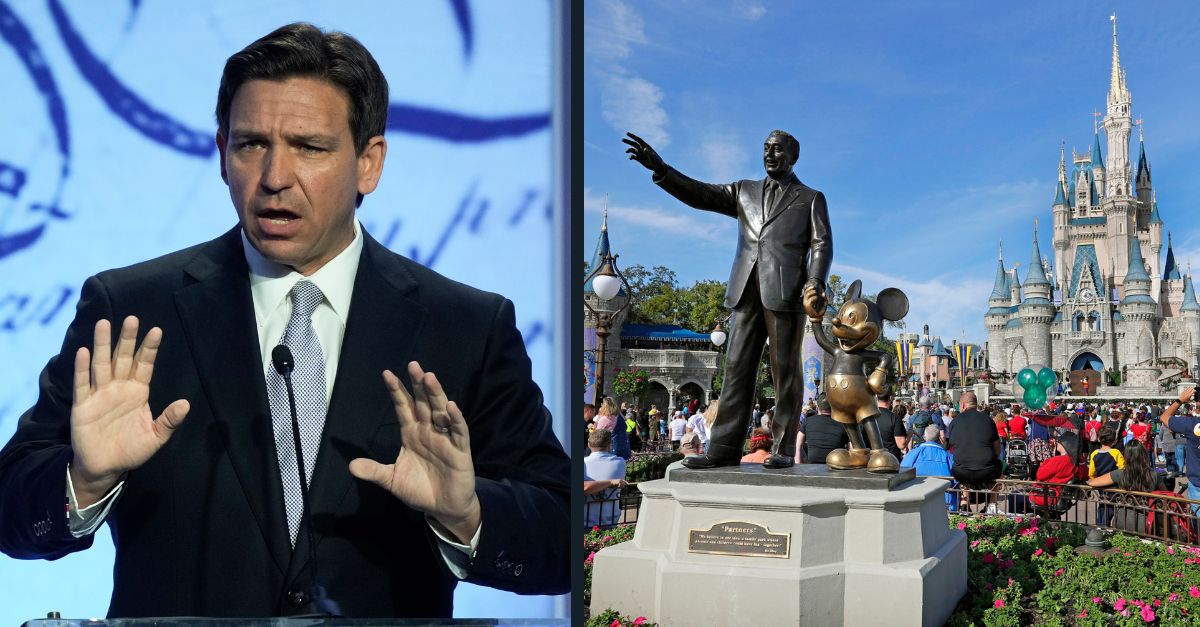
Left: Republican presidential candidate Florida Gov. Ron DeSantis speaks at the Moms for Liberty meeting in Philadelphia, Friday, June 30, 2023. (AP Photo/Matt Rourke)
Right: A statue of Walt Disney and Mickey Mouse stands in front of the Cinderella Castle at the Magic Kingdom at Walt Disney World in Lake Buena Vista, Fla., Jan. 9, 2019. (AP Photo/John Raoux, File).
A federal judge has thrown out the Magic Kingdom’s First Amendment lawsuit against Florida Gov. Ron DeSantis over the Sunshine State’s so-called “Don’t Say Gay” law.
U.S. District Judge Allen C. Winsor issued a ruling Wednesday granting Ron DeSantis’ motion to dismiss Disney’s lawsuit against him. As Law&Crime previously reported, Disney sued DeSantis, the state’s commerce secretary, and a tourism board in April 2023. Disney’s complaint alleged constitutional violations and retaliation for Disney’s stated opposition to the state’s anti-LGBTQ “Don’t Say Gay” bill, which prohibits “classroom discussion about sexual orientation or gender identity in certain grade levels or in a specified manner.”
The governor had championed the Florida legislature’s effort to dissolve Disney’s long-standing autonomous economic district, signing a bill in February and replacing the Reedy Creek Development District with the hand-picked “Central Florida Tourism Oversight District” board.
Winsor, a Donald Trump appointee, found that Disney failed to show that it had standing to sue the governor or commerce secretary because the relief sought — an injunction — would not resolve its problem.
“To the extent the Governor contributed to Disney’s injury by appointing CFTOD board members, that action is in the past,” Winsor said. “Because Disney seeks injunctive relief, it must allege an imminent future injury, and it has not alleged facts showing that any imminent future appointments will contribute to its harm.”
“Stopping hypothetical future appointments would not redress any alleged imminent harm,” Winsor later added.
Winsor also found that Disney didn’t make its case as to DeSantis’ control over the CFTOD.
“Allegations that the CFTOD board operates as a ‘state receivership’ under the Governor’s thumb, are conclusory,” the ruling says (citations omitted). “Disney has not alleged any specific actions the new board took (or will take) because of the Governor’s alleged control. In fact, Disney has not alleged any specific injury from any board action. Its alleged injury, as discussed above, is its operating under a board it cannot control. That injury would exist whether or not the Governor controlled the board, meaning an injunction precluding the Governor from influencing the board would not redress Disney’s asserted injury. Disney has not shown standing to sue the Governor.”
As to the secretary of the state’s Department of Commerce, Winsor said that Disney failed to show why they should be a defendant.
“Disney struggled to articulate any injury attributable to the Secretary,” the decision says (citations omitted). “At best, it contends that the Secretary’s duties include ‘maintain[ing] the Official List of Special Districts.’ But that list — or the Secretary’s authority in keeping it — does nothing to affect the CFTOD Defendant’s authority. Thus, even though ministerial duties can sometimes support standing, the Secretary’s list-keeping duties here do not.”
Having dismissed the claims against DeSantis and the commerce secretary, Winsor addressed the merits of Disney’s First Amendment claims as they related to the CFTOD. The judge relied heavily on “settled law” that a “facially constitutional” law — meaning, one that does not single out a particular group for retaliation or discrimination — forecloses Disney’s claims.
“As Disney appropriately acknowledges, the Legislature can determine the structure of Florida’s special improvement districts,” the judge says (citations omitted). “Disney does not argue that the First Amendment (or anything else) would preclude the Legislature from enacting the challenged laws without a retaliatory motivation. The laws here … do not facially ‘impinge on any constitutional rights.””
“[N]o one reading the text of the challenged laws would suppose them directed against Disney,” the ruling also says. “The laws do not mention Disney.”
Winsor found that the laws are constitutional because they affect people and organizations other than Disney, even if the media behemoth bears the brunt of the legal impact.
“Disney offers no support for its argument that the court is to undertake line drawing to determine just how many others a law must cover to avoid ‘singling out’ those they affect most,” the judge wrote. “Here, it is enough to say … that the law ‘challenged in this case is not pinpointed against a named individual or group; it is general in its wording and impact.’”
As to Disney’s claim that DeSantis’ statements about Disney after the company stated its opposition to the “Don’t Say Gay” law, Winsor said it’s not up to courts to look for an unconstitutional motive in passing a law.
“At the end of the day, under the law of this Circuit, ‘courts shouldn’t look to a law’s legislative history to find an illegitimate motivation for an otherwise constitutional statute,’” Winsor wrote. “Because that is what Disney seeks here, its claim fails as a matter of law.”
Winsor dismissed the lawsuit as to DeSantis and the commerce secretary without prejudice, meaning that the entertainment giant may be able to successfully refile the case. Disney may not, however, renew its claims against the CFTOD, which Winsor dismissed with prejudice.
While it’s unclear whether Disney has a path forward — considering that Winsor dismissed the case on the merits, and not just for subject matter jurisdiction, as to the CFTOD — the company has signaled its intent to appeal.
“This is an important case with serious implications for the rule of law, and it will not end here,” a Disney spokesperson told Variety. “If left unchallenged, this would set a dangerous precedent and give license to states to weaponize their official powers to punish the expression of political viewpoints they disagree with. We are determined to press forward with our case.”
Read Winsor’s ruling here.
Have a tip we should know? [email protected]

